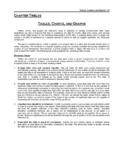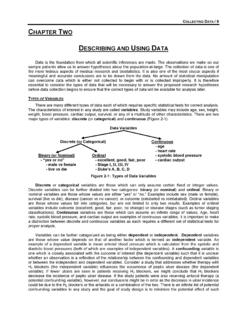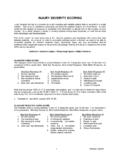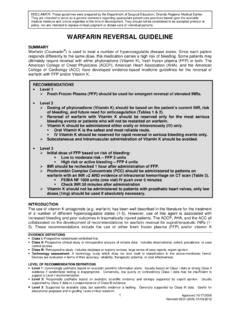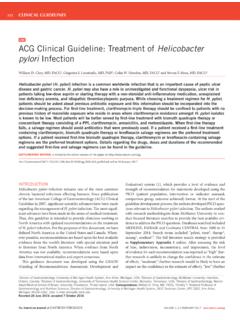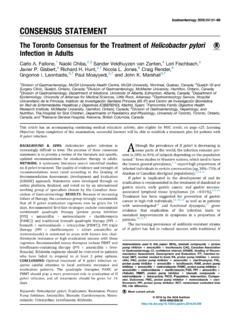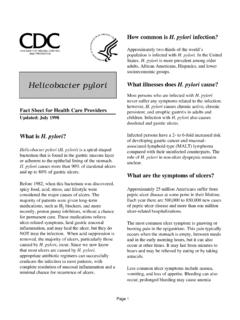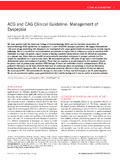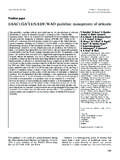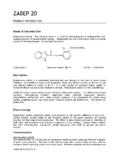Transcription of ACUTE UPPER GASTROINTESTINAL HEMORRHAGE: …
1 DISCLAIMER: These guidelines were prepared by the Department of Surgical Education, Orlando Regional Medical Center. They are intended to serve as a general statement regarding appropriate patient care practices based upon the available medical literature and clinical expertise at the time of development. They should not be considered to be accepted protocol or policy, nor are intended to replace clinical judgment or dictate care of individual patients. EVIDENCE DEFINITIONS Class I: Prospective randomized controlled trial. Class II: Prospective clinical study or retrospective analysis of reliable data. Includes observational, cohort, prevalence, or case control studies. Class III: Retrospective study.
2 Includes database or registry reviews, large series of case reports, expert opinion. Technology assessment: A technology study which does not lend itself to classification in the above-mentioned format. Devices are evaluated in terms of their accuracy, reliability, therapeutic potential, or cost effectiveness. LEVEL OF RECOMMENDATION DEFINITIONS Level 1: Convincingly justifiable based on available scientific information alone. Usually based on Class I data or strong Class II evidence if randomized testing is inappropriate. Conversely, low quality or contradictory Class I data may be insufficient to support a Level I recommendation. Level 2: Reasonably justifiable based on available scientific evidence and strongly supported by expert opinion.
3 Usually supported by Class II data or a preponderance of Class III evidence. Level 3: Supported by available data, but scientific evidence is lacking. Generally supported by Class III data. Useful for educational purposes and in guiding future clinical research. 1 Approved 12/11/01 Revised 5/16/06, 06/05/12 ACUTE UPPER GASTROINTESTINAL hemorrhage : PHARMACOLOGIC MANAGEMENT SUMMARY Non-variceal Bleeding: Recurrent GASTROINTESTINAL bleeding (GIB) occurs in 15-20% of patients with UPPER GASTROINTESTINAL (GI) hemorrhage . Maintaining a local pH > is necessary for coagulation and platelet aggregation. Intravenous proton pump inhibitor (PPI) therapy, administered after successful endoscopic therapy, has been shown to decrease the incidence of rebleeding in high-risk patients and are preferred over H2-receptor antagonists (H2RA) (3,4).
4 The eradication of Helicobacter pylori has been shown to decrease recurrence of peptic ulcer disease as well as rebleeding (5,6). Variceal Bleeding: Endoscopic therapy is first-line therapy in the management of bleeding esophageal varices. Although octreotide should not be considered a substitute, it has been successfully used to achieve hemostasis and provides an option in the circumstances where endoscopy is not immediately available or possible. Octreotide is also effective in the prevention of rebleeding following sclerotherapy or ligation and is preferred over vasopressin due to similar efficacy and fewer adverse effects. RECOMMENDATIONS Level 1 Non-variceal Bleeding Endoscopy should be performed within 24 hours of presentation.
5 Proton pump inhibitors (PPI) (pantoprazole 40mg IV Q12H) should be administered to decrease the incidence of rebleeding for up to 72 hours. Patients should be continued on oral PPI therapy (pantoprazole 40mg PO Q24H) duration dependent on indication. H2-receptor antagonists (H2RA) should not be used in the ACUTE management of non-variceal GASTROINTESTINAL hemorrhage . Test for and treat Helicobacter pylori infection. Variceal Bleeding: Endoscopy should be performed within 12 hours of presentation. Octreotide (25-50 mcg/hr for 2-5 days) is the drug of choice for patients with bleeding esophageal varices. Level 2 None Level 3 None 2 Approved 12/11/01 Revised 5/16/06, 06/05/12 INTRODUCTION Non-variceal Bleeding: The management of ACUTE GI hemorrhage includes volume resuscitation (crystalloid, colloid, and blood), endoscopic therapy, and/or surgery.
6 Unfortunately, recurrent bleeding occurs in 15-20% of cases (1). Patients with endoscopic evidence of active arterial bleeding or non-bleeding visible vessel (NVBB) are at highest risk (90% and 50%, respectively) (2). Those with non-bleeding adherent clot, flat spot, or clean ulcer base have a 25%, <10%, and <5% rebleeding risk, respectively (2). The potential benefit of pharmacologically raising local pH arises from in vitro studies demonstrating that coagulation and platelet aggregation are pH dependent (8).Despite medical and surgical advances, the mortality associated with recurrent bleeding remains 10-14% (3). Multiple meta-analysis have demonstrated more consistent pH attainment and probably decreased rate of rebleeding associated with PPIs compared to H2 RAs (4,9,10).
7 Current consensus guidelines recommend high-dose PPI therapy only due to consistently demonstrated reduction in risk of rebleeding and need for surgical intervention (11). More recently, the need for high-dose continuous infusion PPI therapy has been investigated and there was no difference in rebleeding, hospital length of stay, or mortality (12). Variceal Bleeding: Primary management of esophageal variceal bleeding is endoscopic therapy (7). However, several medications have been evaluated as adjunctive therapy to endoscopy. These agents include vasopressin, glypressin (or terlipressin), somatostatin, and octreotide. Vasopressin and octreotide are the only agents commercially available in the United States.
8 The use of vasopressin is intended to decrease portal venous pressure and increase clotting and hemostasis. Although vasopressin may provide effective control of bleeding, there is no evidence that overall survival is improved and it has several potential adverse effects including myocardial ischemia. Octreotide, a synthetic somatostatin analogue, is more effective in achieving initial control of bleeding and also as an adjunct to endoscopic sclerotherapy to prevent rebleeding. Octreotide also has fewer complications compared to vasopressin (7, 13-19). LITERATURE REVIEW Non-variceal Bleeding: Green FW, conducted an in vitro study demonstrating that coagulation and platelet aggregation are optimal at a local pH of Clotting times doubled at a pH of and quadrupled at a pH of 6.
9 Platelet aggregation was 77% (normal 70-84%) at a pH of but this decreased to 24% at a pH of and no aggregation was observed at a pH of (8). Based on this information, the goal of pharmacologic therapy is to maintain an intragastric pH 6 to facilitate adequate clotting. The use of H2 RAs versus PPIs has been reviewed in a few clinical trials and a number of meta-analyses (4,9,10). Based on the currently available information, PPIs have been demonstrated to more consistently maintain an intragastric pH ~6, are associated with fewer rebleeding episodes or need for surgery compared to either H2 RAs or placebo (3,4). In patients with actively bleeding ulcers or NBVV, PPIs have been shown to decrease mortality (3).
10 Current guidelines recommend high-dose continuous infusion PPIs ( , pantoprazole 80 mg IV bolus, then pantoprazole 8 mg/hr). However, two recent trials and two meta-analyses have demonstrated no difference in efficacy with low-dose therapy ( pantoprazole 40 mg IV Q12-24H) compared to the high-dose continuous infusion (12, 20-22). Andriulli A, randomized 474 patients to receive either high-dose (PPI 80 mg bolus, 8mg/hr infusion, n=238) therapy or low-dose (PPI 40 mg IV q24, n=236). The authors demonstrated no difference in rebleeding ( vs. , p= ), need for surgery ( vs. , p= ), or mortality ( both) (12). Similarly, Hus Y, randomized 120 patients to either high dose (PPI 80 mg bolus, 8mg/hr, n=60) or low-dose (PPI 80mg bolus, 40 mg IV Q6H, n=60).

